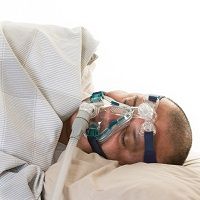Article
Central Sleep Apnea Increases Risk of Atrial Fibrillation in Older Men
Author(s):
A new prospective study supports retrospective analyses that link central sleep apnea and Cheyne Stokes respiration with the onset of atrial fibrillation in older men, particularly those age 75 years and older.

A new prospective study supports retrospective analyses that link central sleep apnea and Cheyne Stokes respiration with the onset of atrial fibrillation (AF) in older men, particularly those age 75 years and older.
Researchers assessed 843 AF-free men for central sleep apnea, obstructive sleep apnea, hypoxemia and Cheyne Stokes respiration. They then followed those patients for a mean period of 6.5 years, periodically checking in to see which patients had developed AF.
Even after adjusting for other known risk factors for AF — age, race, body mass index, cardiopulmonary disease, alcohol use, pacemaker, cholesterol, cardiac medications — the investigators found a significant association between sleep-disordered breathing at baseline and subsequent cases of AF.
Men who began the study with with central sleep apnea were more than twice as likely as other men to develop AF (odds ratio [OR], 2.58; 95% confidence interval [CI], 1.18-5.66; p<0.05). Men with central sleep apnea- Cheyne Stokes respiration faced a similarly elevated risk (OR, 2.27; 95% CI, 1.13-4.56; p<0.05), but men with obstructive sleep apnea or hypoxemia were not significantly more likely to develop AF than men who began the study breathing normally at night.
Even in men over 75 years of age, there was no significant association between obstructive sleep apnea or hypoxemia and incident AF, but the association between the other conditions and an eventual AF diagnosis was even stronger. Such men who began the study with central sleep apnea were nearly 10 times as likely as others in the same age bracket to develop AF (OR, 9.97; 95% CI, 2.72-36.50), while those with central apnea-Cheyne Stokes respiration were more than 5 times as likely as others in the same age bracket to be diagnosed with the condition (OR, 6.31; 95% CI, 1.94-20.51). The investigators also found a significant association, in men over 75 years old, between a patient’s apnea hypopnea index at baseline and that patient’s risk of developing AF (OR, 1.22 for every 5-unit increase in hypopnea index score; 95% CI 1.08-1.39).
The study investigators, whose findings appear in the American Journal of Respiratory and Critical Care Medicine, discussed several mechanisms that might allow sleep-disordered breathing to help trigger new cases of AF (and noted some evidence that AF might also contribute to sleep-disordered breathing), but they were careful to note that their study does not prove that central sleep apnea or Cheyne Stokes respiration cause cardiac arrhythmia.
They also noted a number of potential limitations to their study, including the relatively small number of elderly men who developed AF (which accounts for the very wide spread of the 95% confidence intervals in the over-75 analysis). Another potential limiting factor was survivorship bias; some 390 men with sleep-disordered breathing at the study outset died during the course of the study.
Still, the authors believe that the study findings were significant enough to consider central sleep apnea and Cheyne Stokes respiration as potential markers of AF risk among men who have yet to develop arrhythmia, particularly men who are more than 75 years old. Among such patients, diagnosis of sleep-disordered breathing might be enough to justify more frequent tests for AF.




